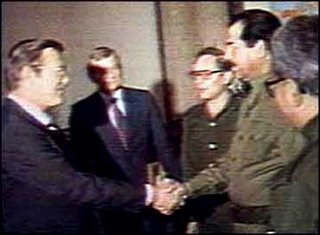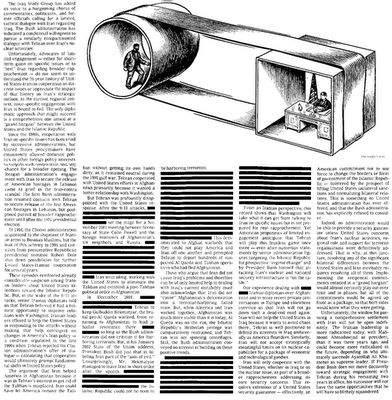
HACE MUCHO TIEMPO QUE SE PROFETIZO QUE TU TONALI ERA CONOCER LA VERDAD ACERCA DE LAS COSAS DE ESTE MUNDO Y HACER CONOCER LA VERDAD - Chicóme-Xochitl Tliléctic Mixtli,
Wednesday, December 27, 2006
Monday, December 18, 2006
Tuesday, December 12, 2006
NORTH TO ALASKA, THEY'RE GOING NORTH, THE RUSH IS ON

Yesterday, the BBC published a graphic showing the impact that climate change will have on crop production. The graphic shows the areas in which wheat grows now (yellow) compared to where it will grow in 2050 (blue). It demonstrates the devastating effect climate change would have on America’s wheat crop:
Monday, November 13, 2006
NEOCONSERVATIVE: CHALABI
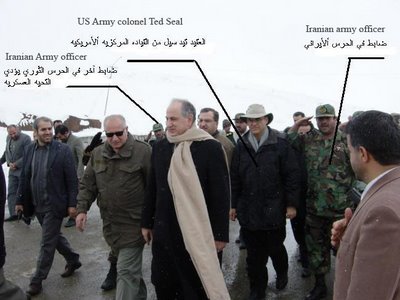
The neoconservatives don't play much of a role in this account, which is a military history and a fair reflection of what were the forces that led us to this outcome, but one place where [they do] is almost like a Marx Brothers movie in the middle of this great story of the war. That is, the decision at the last minute to bring in a small number of Chalabi's soldiers so there could be an Iraqi face to the invasion. Then at the last minute, without anyone's knowledge -- not our own military commanders, apparently -- Chalabi himself was flown in. Talk a little about that, because he was an embodiment of the neoconservative idea, that this would become a transformation of Iraq.
Well, it's a really odd episode that I was able to report on the record, because I interviewed the American military officer who was the liaison with Chalabi. An American Army colonel, Ted Seal, was assigned to be with Chalabi and his fighters as a liaison officer, and every day he would get on the phone and report back to CENTCOM the status of Chalabi's fighters, unvetted. A lot of them were from Iran, by the way -- Iraqis who had fled to Iran. One day he gets an instruction to call General Abaziad, who is now the central commander, but he was then General Franks' deputy. General Abaziad says, "How many fighters does Chalabi have?," and this was at the time when we were coming up against the Fedayeen, it was getting a little tougher, the fall was going on, people were getting a little nervous about how this is going. Colonel Seal said, "Well, I'll ask him, he's standing right next to me." He said, "Ahmed, how many fighters do you have?" He said, "I have a thousand." So, Seal gets on the phone, "Uh, seven hundred." And they said, "Well, we'll fly them down there."
And so, it was agreed that they would be flown down to Talil and they would be kind of an Iraqi "Free French"-type force, you know, the Iraqi freedom fighters, and they would join us and they would speak the language at least, and they would be Iraqis, and forces that were reluctant to surrender to the Americans might surrender to them. Well, it emerged during this that Chalabi also wanted to go, and General Abaziad hadn't bargained for that. There was a discussion between [Abaziad] and Paul Wolfowitz; he didn't want to introduce a would-be politician into Iraq and take sides, but Wolfowitz's point was basically, "You're the guy that asked for his fighters and the fighters want their leader." So, they all do go down to Talil, they end up playing no constructive role in the war whatsoever, and Chalabi uses the opportunity to go to Nasariya and start making speeches. It's one of the little known but very interesting sub-themes in this war.
and
Chalabi got rid of his forces [mostly from Kurds and Iraqi refugees in Iran], and he brought another forces we don’t know them, or where they came from.
We where not allowed to have any contact with them, all what we saw is; they leave their camp [in Al-sayd club in Baghdad] in the evening and come back next day in the early morning, later we knew they had a death-list, this is the beginning of the “Death-Squads”.
Are they under the US command or Iranian command? I don’t know
SHIITE: INTERIOR MINISTER JAWAD AL-BOLANI
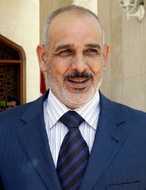
Key lawmakers from al-Maliki's Islamic Dawa Party said that in the coming Cabinet shake up, which the prime minister promised during a closed-door parliament session Sunday,
Interior Minister Jawad al-Bolani was at the top of the list to lose his post because police and security forces were failing to quell the unbridled sectarian killing that has reached civil war proportions in Baghdad and the center of the country.
Al-Bolani, a Shiite who was chosen in June and a month after al-Maliki's government was formed, is an independent. The United States demanded that the defense and interior posts be held by officials without ties to the Shiite political parties that control militia forces.
The interior minister controls police and other security forces which already are infiltrated by the Badr Brigade and the Mahdi Army, the armed wing of al-Sadr's political movement.
SUNNI: DEFENSE MINISTER ABDUL-QADIR aL-OBAIDI
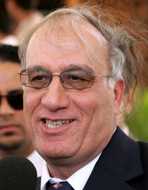
Also Sunday, the country's Sunni defense minister challenged Prime Minister Nouri al-Maliki's contention that the U.S. military should quickly pull back into bases and let the Iraqi army take control of security countrywide.
Defense Minister rejected calls by al-Maliki for the U.S. military to speed transfer of security operations throughout the country to the Iraqi army, saying his men still were too poorly equipped and trained to do the job.
"We are working hard to create a real army and we ask our government not to try to move too quickly because of the political pressure it feels. Our technical needs are real and that is very important, if we are to be a real force against insecurity," al-Obaidi said.
TURKEY ON KURDISTAN
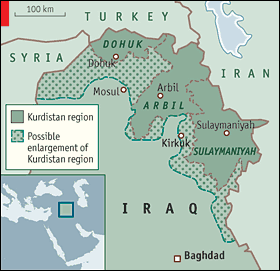
Abdullah Gul, Turkey's foreign minister
Hurriyet, a leading Turkish newspaper, published an interview with Mr Gul, in which he appeared not only to pronounce on the future of Iraq but also to hint to the country's Kurds that there might be dire consequences if they proceed with their drive for greater self-determination. In unusually blunt language, Mr Gul warned them
- not to pursue any dream of a separate Kurdish state,
- to let go of their designs on the oil-rich city of Kirkuk,
- and to stop protecting the guerrillas of Turkey's Kurdistan Workers' Party (PKK), which has bases in the mountains of northern Iraq.
Iraq's neighbours, he said, would not stand by and watch the country being carved up.
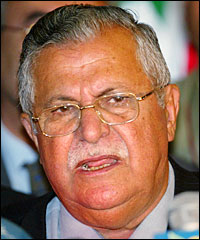
He warned Iraq's Kurdish leaders, Jalal Talabani, the Iraqi president, and Massoud Barzani, the president of the Kurdistan regional government (KRG), not to rely on America's continued presence. They “should not forget that Turkey will remain in the region forever.”
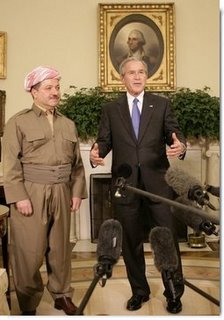
Turkish observers interpreted the foreign minister's remarks as primarily for domestic consumption. His ruling AK party is under pressure from nationalists because of the continuing demands being placed on it by the European Union;
So far as the PKK is concerned, the KRG spokesman pointed out that Iraq's Kurds were now taking part in formal discussions with Turkey and America to find a peaceful solution.
It was Mr Gul's caution over the status of Kirkuk that has most upset the Kurds. They insist
- “Arabisation” of the city must be reversed,
- After this -- a referendum whether to join the Kurdish federal region.
But Turkey opposes the whole process, fearing that control of Kirkuk's oil would give the Kurds an economic platform for independence. Thus, on Kirkuk at least, Mr Gul's warning is worrying.
Sunday, November 12, 2006
Izzat Ibrahim al-Duri
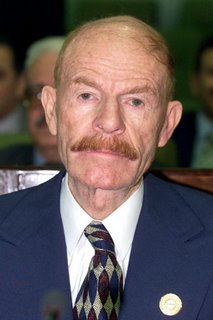
Al-Quds al-Arabi publishes a summary of a statement by Baath resistance leader Izzat Ibrahim al-Duri denouncing the recent AP-originated story about laying down their arms, and attributing it to the occuption's disinformation campaign. Al-Duri writes: "Let the dogs of Rome (meaning the empire), and before them the Safavid dogs of Persia know, crouched in their Green Zone fortress, that the coming days will be darker for them than a moonless night..." which is his way of saying they haven't laid down their arms. Moreover, Al-Duri goes out of his way to deny that there are any contacts at all between the Baath resistance and the Americans, in Amman or anywhere else. And he says there won't be until the conditions that were originally laid down have been met (timetable for withdrawal, restoration of the Baath, and so on). Which suggests that at least from the Baath point of view, any contacts there may have been in the past have not led to any continuing contacts.
Izzat Ibrahim Al-Douri (born July 1, 1942) was an Iraqi military commander and was vice-president and deputy chairman of the Revolutionary Command Council until the 2003 U.S.-led invasion of Iraq. [1][2][3]
His family hails from the region around Tikrit, where his father worked as an ice seller. At the time of the invasion, Al-Douri, along with President Saddam Hussein and Vice President Taha Yassin Ramadan, were the three surviving plotters who brought the Ba'ath Party to power in a coup in 1968. [3]Following the coup, he continued to retain a prominent position in the Ba'ath regime. This was aided by the fact that Al-Douri came from the same clan area as Saddam and had not disposed of a power base; thus he did not pose a threat to Saddam's ambitions.
Thursday, November 09, 2006
FRONTLINE: Return of the Taliban ( a film)
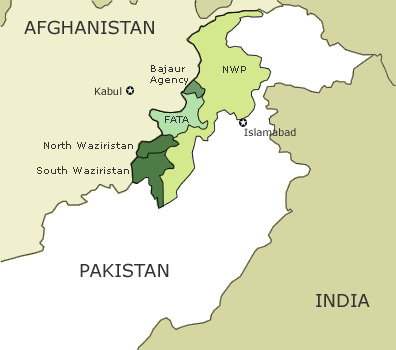

See also from CFR
The Tribal Areas of Pakistan
Author:
Carin Zissis, Staff Writer
November 9, 2006
* Introduction
* What are the Pakistani tribal areas?
* How are the tribal agencies governed?
* Do religious extremists operate in the tribal lands?
* What is the role of the Pakistani government in the tribal lands?
* What is the Miramshah Agreement?
* What are the Bajaur accords?
* Are Islamabad’s agreements with these semi-autonomous areas effective?
* What does the future hold for the tribal areas?
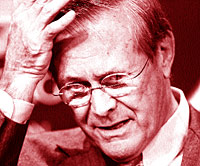
‘Reports that say that something hasn’t happened are always interesting to me, because as we know, there are known knowns; there are things we know we know. We also know there are known unknowns; that is to say we know there are some things we do not know.
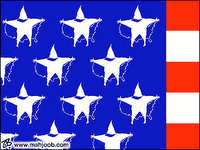 But there are also unknown unknowns — the ones we don’t know we don’t know’ February 2003
But there are also unknown unknowns — the ones we don’t know we don’t know’ February 2003
Wednesday, November 08, 2006
Sunday, November 05, 2006
LICENSED TO KILL

Robert Young Pelton first became aware of the phenomenon of hired guns in the War on Terror when he met a covert team of contractors on the Afghanistan/Pakistan border in the fall of 2003. Pelton soon embarked on a globe-spanning odyssey to penetrate and understand this shadowy world, ultimately delivering stunning insights into the way private soldiers are used.
Enter a blood-soaked world of South African mercenaries and tribal fighters backed by ruthless financiers. Drop into Baghdad’s Green Zone, strap on body armor, and take a daily high-speed ride with a doomed crew of security contractors who dodge car bombs and snipers just to get their charges to the airport. Share a drink in a chic hotel bar with wealthy owners of private armies who debate the best way to stay alive in war zones.
Licensed to Kill spans four continents and three years, taking us inside the CIA’s dirty wars; the brutal contractor murders in Fallujah and the Alamo-like sieges in Najaf and Al Kut; the Deep South contractor training camps where ex-Special Operations soldiers and even small town cops learn the ropes; the contractor conventions where macho attendees swap bullet-punctuated tales and discuss upcoming gigs; and the grim Central African prison where contractors turned failed mercenaries pay a steep price.
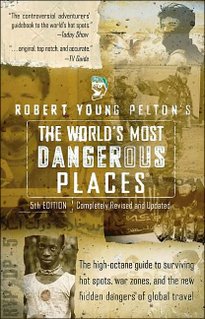
The United States has encouraged the use of the private sector in all facets of the War on Terror, placing contractors outside the bounds of functional legal constraints. With the shocking clarity that can come only from firsthand observation, Licensed to Kill painstakingly deconstructs the most controversial events and introduces the pivotal players. Most disturbingly, it shows that there are indeed thousands of contractors--with hundreds more being produced every month--who’ve been given a license to kill, their services available to the highest bidder.
Thursday, November 02, 2006
BUSH TO RUSH
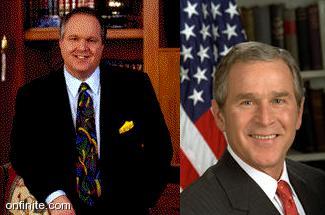
"Give me a second here, Rush, because I want to share something with you," Bush said. "I am deeply concerned about a country, the United States, leaving the Middle East."
Bush said that he was "worried that rival forms of extremists will battle for power, obviously creating incredible damage if they do so; that they will topple modern governments, that they will be in a position to use oil as a tool to blackmail the West."
"People say, 'What do you mean by that?'" The president continued. "I say, 'If they control oil resources, then they pull oil off the market in order to run the price up, and they will do so unless we abandon Israel, for example, or unless we abandon allies.'"
"You couple that with a country that doesn't like us with a nuclear weapon, and people will look back at this moment and say, 'What happened to those people in 2006?' and those are the stakes in this war we face," Bush said.
"On the one hand we've got a plan to make sure we protect you from immediate attack, and on the other hand we've got a long-term strategy to deal with these threats, and part of that strategy is to stay on the offense," Bush continued. "Part of the strategy is to help young democracies like Lebanon and Iraq be able to survive against the terrorists and the extremists who are trying to crush their hopes, and part of the democracy is for a freedom movement, which will help create the conditions so that the extremists become marginalized and unable to recruit."
Wednesday, October 25, 2006
ONLINE: Instruments of Statecraft: U.S. Guerilla Warfare, Counterinsurgency, and Counterterrorism, 1940-1990

Instruments of Statecraft: U.S. Guerilla Warfare, Counterinsurgency, and Counterterrorism, 1940-1990 was published in 1992 by Pantheon Books, a division of Random House, Inc.
Informed by recently declassified and previously unpublished documents, Instruments of Statecraft is an authoritative study of American covert, unconventional warfare waged against ideological adversaries, from the Truman administration up to the recent war in the Persian Gulf.
Since World War II, assassination, sabotage, kidnaping, torture, the overthrow of foreign governments, and other terroristic activities have been intrinsic to our national defense policy. These have been justified time and again as necessary to combat communist insurgency and, more recently, terrorism-as the only effective response to the barbarism ascribed to, or projected onto, our enemies- be they Sandinistas or the PLO.
So it is that America has maintained forces -including the OSS, the CIA, the Green Berets, and the Delta Force-that have specialized in dirty warfare with impunity, in Nicaragua, Lebanon, Laos, Vietnam, the Philippines, Afghanistan, Guatemala, Africa, Cuba, Central America, and Greece, among other places.
Michael McClintock gives a fascinating and alarming expose of the dark side of American foreign policy, while examining its tactical roots-from the pronouncements of Clausewitz and Raymond Aron, to its ideological basis in the Monroe Doctrine, Theodore Roosevelt's "Big Stick" foreign policy, and Woodrow Wilson's post-colonialist crusade.
Michael McClintock was born in Ohio and holds a bachelor's degree from Ohio University and a master's degree in political science from the University of Wisconsin. He has been a human rights monitor for the past sixteen years, traveling extensively throughout all of Central America, as well as in Bolivia, Venezuela, Brazil, Thailand, and the Philippines. He is the author of The American Connection, a study of U.S. covert activities in Latin America.
America's Other War: Terrorizing Colombia (Paperback)

Editorial Reviews
Review
"Colombia is the worst humanitarian catastrophe in the hemisphere. The sources are deeply rooted in Colombia's own history, and in policies of the hegemonic power that are no less deeply rooted in its own history and institutions. This study provides a uniquely perceptive analysis of the tragic interaction, and its far-reaching implications for understanding the past and the evolving global order."--Noam Chomsky
"US administrations keep finding new excuses for intervening in Latin American affairs. Colombia is the most blatant example, as Doug Stokes' trenchant account of the US's shifting agenda--from Cold War, to guerrillas, then the drug trade, and now the 'war on terror'--so forcefully shows. Whether called imperialism or technical assistance, the consistent result is state terror and human suffering on a vast scale."--James Petras, Professor of Sociology (retired), Binghamton University, New York
"The two great turning-points of the last few years have, or so we've been told, been the end of the Cold War and 9/11. Not so argues Doug Stokes in this most challenging of volumes. Now, as before, the United States pursues the same hegemonic project simply using different cover stories--first communism, then drugs and now terrorism--to justify intervention in Colombia. For those looking for reassurance this is not the book for them: for those however seeking to peel back the layers of officialese and get to the heart of things this is a must read."--Michael Cox, London School of Economics and Editor of International Politics
"Doug Stokes shows that there is depressingly little 'new' about the growing U.S involvement in Colombia's conflict. With very thorough research and a highly readable narrative, the book goes beyond the liberal-conservative debate over Plan Colombia, the 'war on drugs' and the 'war on terror', reminding us of the central role played by the often brutal pursuit of economic interests."--Adam Isacson, Director of Programs, Center for International Policy, Washington
Book Description
This controversial book maintains that in Colombia the US has long supported a pervasive campaign of state violence directed against both armed insurgents and a wide range of unarmed progressive social forces. While the context may change from one decade to the next, the basic policies remain the same: maintain the pro-US Colombian state, protect US economic interests and preserve strategic access to oil. Colombia is now the third largest recipient of US military aid in the world, and the largest by far in Latin America. Using extensive declassified documents, this book shows that the so-called "war on drugs", and now the new war on terror in Colombia are actually part of a long-term Colombian "war of state terror" that predates the end of the Cold War with US policy contributing directly to the human rights situation in Colombia today.
AUGUSTUS CHENEY
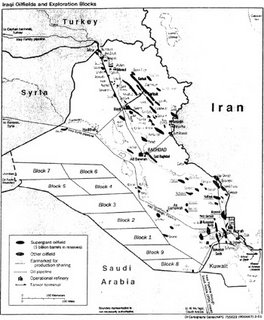
At the above left, you'll see the map which Cheney showed to oil, gas, and electricity men (including Enron's Ken Lay) in March, 2001. He touted the "blocks" on the West side of Iraq as virgin, unexplored territory chock full of oil and gas. They probably then divvied up those blocks based upon the dictates of Mr. Quid, Mr. Pro, and Mr. Quo, and nothing has so far abrogated whatever secret deals were made. The map is part of 7 pages of documents turned over by the Commerce Department under a March, 2002 court order handed down from Judicial Watch's Freedom of Information Act lawsuit against Cheney's Energy Task Force. Cheney was able to keep these seven docs in the dark until March of this year, and the proceedings are still secret. Using the charts, it's not too hard to connect the dots if you accept Robert's Rules of Order and combine them with human nature. In addition to maps of Iraq''s oilfields, pipelines, terminals and refineries, the documents include a list of "foreign suitors" for Iraq's oil. The game was how to keep foreign suitors out of a purported treasure trove. This meant walling off Russia militarily, and keeping China's nouveau riche suitors black-balled in the MidEast oil majors club.
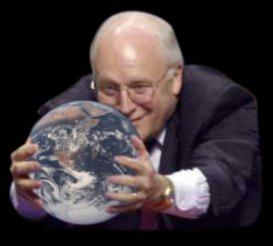
Here is Engdahl's Cheney dissection, and in his boil-down we begin to glean how reality-based historians will approach the subject of the Bush Administration's ill-chosen moves:
...disregard for its allies as well as its foes. That reckless policy has been
associated with former Halliburton chief executive officer and now vice
president, Dick Cheney, more than any other figure in Washington.
The "Cheney presidency", which is what historians will no doubt dub the
George W Bush years, has been based on a clear strategy. It has often been
misunderstood by critics who had overly focussed on its most visible
component, namely, Iraq, the Middle East and the strident war-hawks around
the vice president and his old crony, Defense Secretary Donald Rumsfeld.

The "Cheney strategy" has been a US foreign policy based on securing direct
global energy control, control by the Big Four US or US-tied private oil
giants - ChevronTexaco or ExxonMobil, BP or Royal Dutch Shell. Above all, it
has aimed at control of all the world's major oil regions, along with the
major natural gas fields. That control has moved in tandem with a growing
bid by the US for total military primacy over the one potential threat to
its global ambitions - Russia. Cheney is perhaps the ideal person to weave
the US military and energy policies together into a coherent strategy of
dominance. During the early 1990s under father Bush, Cheney was also
secretary of defense.
**Thanks to Adored By Hordes
Challenging Late Capitalism, Neoliberal Globalization, & Militarism (Paperback)
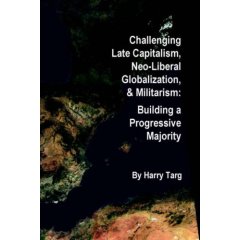
Posted by Carl Davidson
Book Review
Harry Targ
Challenging Late Capitalism, Neo-Liberal Globalization & Militarism: Building A Progressive Majority
ChangeMaker Books, 2006
Reviewed By Mark Solomon
What committed progressive would not want to have a powerful handbook that bares the sources of today's real evil and how to defeat it? a handbook for his or her own enlightenment as well as a tool to pass on to others for educating and activating?
That's exactly what Harry Targ's Challenging Late Capitalism delivers. This briskly written book opens with an insightful, devastating critique of the Bush regime's failure to extend succor to Katrina's victims. It concludes with a powerful exploration of the need to build coalitions grounded in concrete programs. Along the way, the reader is given a clear and insightful analysis of the root causes of today's multi-faceted crises along with an illuminating path to forging a winning progressive majority.
Through a Marxist materialist prism, 'Challenging Late Capitalism' reveals the causes of inequality rooted in the capitalist system built upon the exploitation of labor.Exploitation inevitably engenders class struggle that in turn foments a broad political culture carrying the seeds of transforming change.
The book then moves to an analysis of present-day 'late capitalism' ? defining its characteristics,especially the enormous concentration of capital while describing the disastrous consequences of a global system based upon 'neo-liberal' exploitation of countries of the Global South as well as its systematic destruction of social services and labor's rights in both developed and developing countries. The alleged advantages of 'free trade' are exposed as a myth; the emergence in the world system of a highly regressive 'virtual economy' driven by speculation and paper exchanges is described; the negative impact of neo-liberalism upon employment and the general well being of workers is documented; a militarized economy and its impact upon social well being is summed up; intensified racism, sexism and homophobia is underscored; the conjunction of corporate capital and religious fundamentalists merged into a powerful right wing political movement is identified as the principal threat to progress today.
The final chapters of Challenging Late Capitalism explore the historic and present day character of resistance to the oppressive nature of contemporary corporate-dominated society. Various movements from single-issue reform campaigns to transforming multi- issue struggles are surveyed in order to provide a sound starting point and foundation for drawing various strands of battle for justice,peace and democracy into a vibrant progressive majority.
This book offers a sound basis for fighting back and turning this county and globe towards a peaceful, just and sustainable world. It deserves to be read widely and to be utilized in that greatest of battles for the liberation of all humankind.
[Mark Solomon, historian, is the author of The Cry Was Unity: Communists and African Africans, 1917-1936, University Press of Mississippi, 1998.]
THE LAST THOMAS FRIEDMAN YOU WILL EVER NEED TO READ
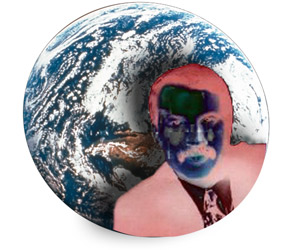
Get ready for a special tour of a renowned outlook, conjured from the writings of syndicated New York Times columnist Thomas Friedman. As the leading media advocate of “free trade” and “globalization,” he is expertly proficient at explaining the world to the world. If we could synthesize Friedman’s brain waves, the essential messages would go something like this:
Silicon chips are the holy wafers of opportunity. From Bangalore to Bob’s Big Boy Burgers, those who understand the Internet will leave behind those who do not.
I want to tell you about Rajiv/Mohammed/George, now doing awesome business in Madras/Amman/Durham....
Saturday, October 21, 2006
Tuesday, October 17, 2006
GOD SAVE THE KING
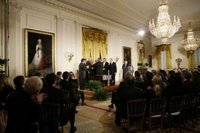
Not that public opinion cared or even took much note, but today was the most important milestone in the history of this country.
The republic effectively ended today with the signing of the "Military Commissions Act."
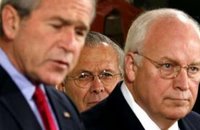
With this new law the country became a place in which the president/commander in chief can classify whomever he likes as an enemy combatant beyond the reach of habeas corpus. This means that the executive branch can arrest and hold without trial anyone in the world (including American citizens). He can also hold that prisoner indefinitely without confronting the detained with the case against him/her or the evidence involved.
You are now "subjects" and not citizens.
If you watched Generals Hayden and Pace who were artfully positioned behind the sovereign at the signing, you saw a lot of blinking. They know what they have done, and so does Senator Warner.
The legislation also set the standards under which you can be tortured.
Anyone who thinks this is for someone in another country should think again. The GWOT is a false metaphor. The neoconservatives real enemies are in this country and it is up to them to say who those enemies are.
President George W. Bush looks up as he signs the Military Commissions Act of 2006 in the East Room of the White House in Washington, October 17, 2006. (Kevin Lamarque/Reuters)
U.S. Secretary of Defense Donald Rumsfeld (C) and Vice President Dick Cheney listen to U.S. President George W. Bush speak before signing the Military Commissions Act of 2006 in the East Room of the White House in Washington October 17, 2006. The legislation sets standards for interrogating suspects, but through a complex set of rules that human rights groups say could allow harsh techniques bordering on torture, such as sleep deprivation and induced hypothermia. REUTERS/Kevin Lamarque (UNITED STATES)
U.S. President George W. Bush shakes hands after signing the Military Commissions Act of 2006 in the East Room of the White House in Washington October 17, 2006. The legislation sets standards for interrogating suspects, but through a complex set of rules that human rights groups say could allow harsh techniques bordering on torture, such as sleep deprivation and induced hypothermia. REUTERS/Kevin Lamarque (UNITED STATES)
U.S. President George W. Bush speaks before signing the Military Commissions Act of 2006 in the East Room of the White House in Washington October 17, 2006. With Bush from left are Chairman of the Joint Chiefs of Staff Peter Pace, Attorney General Alberto Gonzales, Secretary of Defense Donald Rumsfeld and Vice President Dick Cheney. REUTERS/Kevin Lamarque (UNITED STATES)
U.S. President George W. Bush speaks before signing the Military Commissions Act of 2006 in the East Room of the White House in Washington October 17, 2006. With Bush are (from L) CIA Director Michael Hayden, Chairman of the Joint Chiefs of Staff Peter Pace, Attorney General Alberto Gonzales, Secretary of Defense Donald Rumsfeld and Vice President Dick Cheney. REUTERS/Kevin Lamarque (UNITED STATES)
President Bush looks towards lawmakers as he gets ready to sign the Military Commissions Act of 2006, which sets new standards expediting the interrogation and prosecution of terror suspects, during a ceremony in the East Room of the White House in Washington, Tuesday, Oct. 17, 2006. Looking on, from left are: Rep. Chris Cannon, R-Utah; Rep. Steve Buyer, R-Ind.; Rep. James Sensenbrenner, R-Wis.; Sen. Lindsey Graham, R-S.C.; Rep. Duncan Hunter, R-Calif.; Sen. John Warner, R-Va. (AP Photo/Charles Dharapak)
Thursday, October 05, 2006
Theatre Goal: Iraq

The open threats against the Iraqi government underscore the fraudulent character of the Bush administration’s claims to be establishing “democracy” in Iraq. From the outset, Washington’s aim was to create a pliable client state that would open Iraq’s vast oil and gas reserves to US-based energy conglomerates and allow its territory to be used for permanent US military bases. The White House operates with open contempt for any notion that Iraq is a sovereign state.
Gary Leupp Quote: US Strategic Goal
U.S. needs to acquire hegemony over Southwest Asia to control the flow of oil from the Persian Gulf and Caspian Sea, encircle rising China, cow allies and future foes alike with a string of military bases in the region, and maybe make the neighborhood friendlier to Israel…the whole project and international reactions to it should be understood in the context of inter-imperialist competition, rather than mere lust for petrol.
Gary Leupp
Democrats & republicans are united on the necessity–and the strategy–for U.S. world hegemony spelled out a decade ago by democrat Zbigniew Brzezinski in the GLOBAL CHESSBOARD, codified in the current NSS of the U.S.:
Gary Leupp
Democrats & republicans are united on the necessity–and the strategy–for U.S. world hegemony spelled out a decade ago by democrat Zbigniew Brzezinski in the GLOBAL CHESSBOARD, codified in the current NSS of the U.S.:
Hizb Allah, Party of God
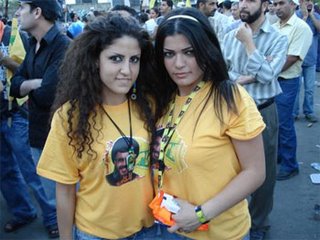
Over 1 million Lebanese gathered in a vast square in a southern Beirut suburb on Sept. 22 to celebrate their country’s largely successful campaign against Israel. Seyid Hassan Nasrallah, secretary-general of Hizballah, risked his life by appearing in public after Israeli leaders had sworn to kill him, and spoke to his adoring supporters in Lebanon and around the world.
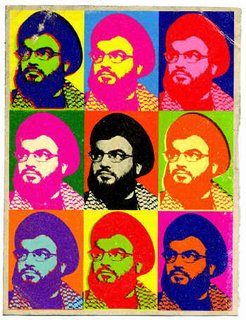
Surveying this massive crowd of boisterous people—the men and women, the teenagers and the small children, celebrating their identity and their steadfastness together with music—I knew this was not the stuff of religious fundamentalism or terrorism. I was struck by how the reality of Hizballah differed from its distorted image in the West. For although Hizb Allah, the Party of God, is undoubtedly of Shia origin, it is in fact a secular movement, addressing real temporal issues, its leaders speaking in a nationalist discourse, avoiding sectarianism and religious metaphors. They participate in politics, compromising and negotiating, and do not seek to impose Islamic law on others. Proof of this is readily available in Hizballah strongholds, where many of their followers are secular, supporting Hizballah because it represents their political interests and defends them.
PHOTO
Two young Lebanese women sport T-shirts emblazoned with the image of Hizballah leader Seyid Hassan Nasrallah, who became perhaps the most popular leader in the Middle East in the wake of Israel’s 33-day war with Hizballah this summer. They are pictured here at a Sept. 22 Hizballah victory rally in a southern Beirut suburb.
Monday, October 02, 2006
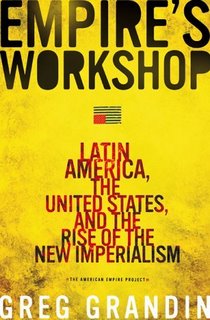
From Publishers Weekly
America's post-9/11 policy of idealistic military adventurism has a long history, argues this incisive study. NYU historian Grandin (The Blood of Guatemala) sketches the vexed course of U.S. relations with Latin America, but focuses on the Reagan administration's involvement in Central America during the 1980s, when it backed the Salvadoran government in a brutal civil war against left-wing insurgents and the Nicaraguan Contras against the Sandinista regime. Then as now, Grandin contends, Washington justified a militarist stance by citing a threat to America (Communists advancing on the Rio Grande) and championing democracy and human rights. America did not send troops but did sponsor native death squads in El Salvador,
 and the author notes recent press reports that the U.S. military is sponsoring similar death squads in Iraq. Grandin's conception of American imperialism—covering everything from outright invasion to corporate investment and Fed interest-rate hikes—is too broad, and he overstates the importance of Central America in the making of the American New Right. But this timely book offers an analysis of the ideological foundations of today's foreign policy consensus and a cautionary tale about its dark legacy. (May 8)
and the author notes recent press reports that the U.S. military is sponsoring similar death squads in Iraq. Grandin's conception of American imperialism—covering everything from outright invasion to corporate investment and Fed interest-rate hikes—is too broad, and he overstates the importance of Central America in the making of the American New Right. But this timely book offers an analysis of the ideological foundations of today's foreign policy consensus and a cautionary tale about its dark legacy. (May 8)Copyright © Reed Business Information, a division of Reed Elsevier Inc. All rights reserved.
Christian Faith and the Truth Behind 9/11

Probing disturbing questions that beg for a response from the Christian community, distinguished scholar of religion and popular writer David Ray Griffin provides a hard-hitting analysis of the official accounts of the events of September 11, 2001. A tireless investigator, Griffin has sorted through enormous amounts of government and independent data and brought to the surface some very unsettling inconsistencies about what really happened. In this, his latest book, he analyzes the evidence on 9/11 and then explores a distinctively Christian perspective on these issues, taking seriously what we know about Jesus' life, death, and teachings. Drawing a parallel between the Roman Empire of antiquity and the American Empire of today, he applies Jesus' teachings to the current political administration, and he explores how Christian churches, as a community intending to be an incarnation of the divine, can and should respond.

David Ray Griffin is Professor Emeritus of Philosophy and Theology at Claremont School of Theology, Professor of Religion Emeritus at Claremont Graduate University, and Codirector of the Center for Process Studies. He is the author of numerous books, including the popular bestsellers The New Pearl Harbor: Disturbing Questions about the Bush Administration and 9/11 and The 9/11 Commission Report: Omissions and Distortions.
Sunday, October 01, 2006
The War On Truth: 9/11, Disinformation And The Anatomy Of Terrorism (Paperback)
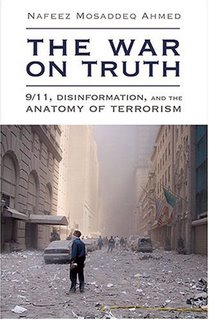
The thesis that Western power continues to connect with al-Qaeda in the pursuit of strategic and economic interests in the key regions mentioned, flies in the face of everything we are force-fed by the official narrative sponsored by governments and mass media. But consider the fact that my research in The War on Truth has been endorsed by people like Robert D. Steele, a retired Marine Corps infantry and intelligence veteran who worked as an operations officer in all four CIA Directorates. Apart from that, Steele was responsible for founding and setting-up the newest US intelligence facility, the Marine Corps Intelligence Center. He described The War on Truth as

“… consistent with both my years of experience as a clandestine case officer, and my extensive reading on national security misadventures. ... I find the author’s speculation that the US, the UK, and France, among others, have been actively using terrorists, nurturing terrorists, as part of a geopolitical and economic strategy… to be completely credible.”
Thursday, September 28, 2006
IMPERIAL HISTORY OF THE MIDDLE EAST
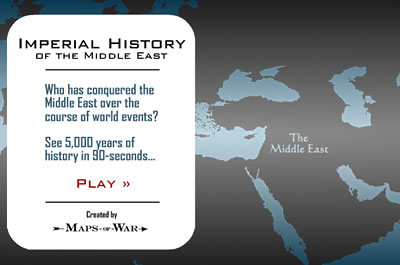
Who has controlled the Middle East over the course of history? Pretty much everyone. Egyptians, Turks, Jews, Romans, Arabs, Greeks, Persians, Europeans...the list goes on. Who will control the Middle East today? That is a much bigger question.
Twenty civilizations in 90 seconds. Press here
1450 Kingdom of Egypt
1340 Hittite Empire
1050 Kingdom of Israel
920 Kingdom of Israel / Kingdom of Judea
721 Assyrian Empire
600 Babylonian Empire
550 Persian Empire
336 Macedonian and Greek Empire
117 Roman Empire
565 Byzantine Empire
750 The Caliphate
1140 Crusader's Kingdom
1187 Saladin's Empire
1279 Mongol Empire
1700 Ottoman Empire
1912 European Colonialism
1920 Nation States and Borders are Established
1948 State of Israel Founded
1979 Era of Independance
You need to make a couple of additions
1) Sumerians
2) Sassanids 602-629,
3) Seljuk Turks 1037-1194
US POLITICAL SYSTEM: ONE GUY, TWO PUPPETS

I think comedian Bill Hicks said it best in this quote from Rant in E-Minor:
I'll show you politics in America. Here it is, right here: "I think the puppet on the right shares my beliefs." "I think the puppet on the left is more to my liking." "Hey, wait a minute, there's one guy holding out both puppets!"
Wednesday, September 20, 2006
THE DEVIL CAME FROM TEXAS - - READ ENTIRE SPEECH HERE
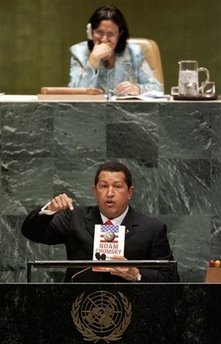
Speech here
...The devil is right at home. The devil, the devil himself, is right in the house.
"And the devil came here yesterday. Yesterday the devil came here. Right here." [crosses himself] "And it smells of sulfur still today.
Yesterday, ladies and gentlemen, from this rostrum, the president of the United States, the gentleman to whom I refer as the devil, came here, talking as if he owned the world. Truly. As the owner of the world.
I think we could call a psychiatrist to analyze yesterday's statement made by the president of the United States. As the spokesman of imperialism, he came to share his nostrums, to try to preserve the current pattern of domination, exploitation and pillage of the peoples of the world.
An Alfred Hitchcock movie could use it as a scenario. I would even propose a title: "The Devil's Recipe."
HUGO GOES TO THE UN TO KICK THE DEVIL IN THE ASS AND SELL NOAM'S BOOK

UNITED NATIONS (AFP) - Venezuela's outspoken President Hugo Chavez has called US president George W. Bush "the devil", "a liar" and a "tyrant" in a scathing attack before the UN General Assembly.
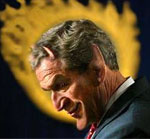
"Yesterday the devil came here and this place still smells of sulphur," Chavez said, referring to Bush's speech at the assembly on Tuesday.
"He came here talking as if he were the owner of the world."
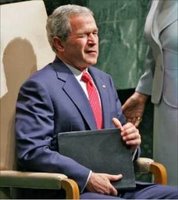
Chavez launched a virulent attack on what he called US "hegemony" and renewed calls for drastic reform of the
United Nations to reduce the US influence.
In a warmly applauded speech in which he quoted at different times left-wing US intellectual Noam Chomsky, Greek philosopher Aristotle and film director Alfred Hitchcock, Chavez also called Bush "a liar" and "a tyrant".
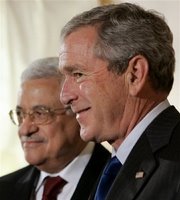
"We cannot allow world dictatorship to be consolidated," he told the assembly.
US "imperialism", he added, was "a threat to the survival of the human race."
Bush promoted "a false democracy of the elite" and a "democracy of bombs", he declared.
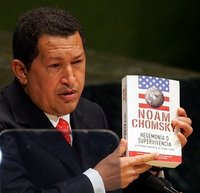
The left-wing Venezuelan president is a frequent critic of the US administration which he accuses of backing a plot to overthrow him.
Washington considers Chavez, a close ally of communist Cuba, to be a destabilizing influence in Latin America. But the United States is a major consumer of Venezuelan oil.
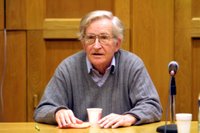
Venezuela's President Hugo Chavez displays author Noam Chomsky's book: 'Hegemony or Survival: America's Quest for Global Dominance' as Chavez addresses the 61st General Assembly of the United Nations at United Nations headquarters in New York September 20, 2006. (Ray Stubblebine/Reuters)
Tuesday, September 19, 2006
"I should have been as tough as Putin": Gorbachev
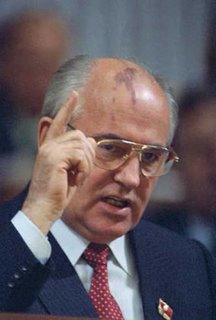
MOSCOW (Reuters) - Former Soviet leader Mikhail Gorbachev said on Tuesday he supported tough measures taken by Russian President Vladimir Putin and wished he had adopted them.
Gorbachev, whose political reforms led to the collapse of the communist empire, said he should have squashed the challenge from Boris Yeltsin, his arch-rival and subsequently first Russian president, by sending him into diplomatic exile.
And he said separatist outbreaks that plagued his last years in power should have been crushed by taking their leaders to court.

"I now support Putin as far as resorting to tough measures to maintain stability is concerned," he said.
Putin, who succeeded Yeltsin in 2000, has moved to restore Kremlin control over Russia, lost in the first post-Soviet decade marked by unending political crises and economic hardships for the majority of the population.
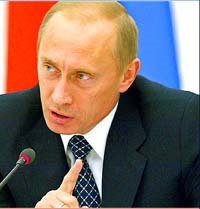
In achieving his goals, Putin has subdued political opposition and put political forces, government and regional administrations under strong Kremlin control triggering Western fears that Russia could be backtracking on democracy.
Putin has described the collapse of the Soviet Union as "one of the greatest geo-political catastrophes of the 20th century".
Subscribe to:
Comments (Atom)


